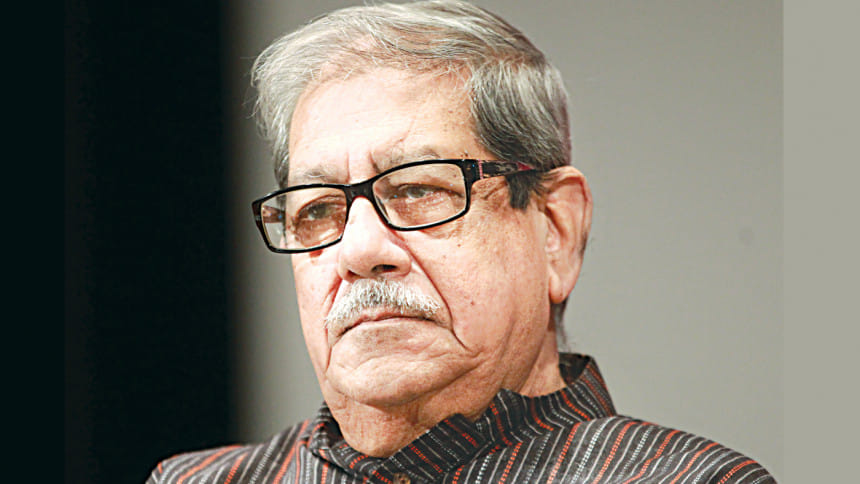Nation loses its GUARDIAN ANGEL

Though a man of literature he became the nation's conscience for his steadfast defence of democracy, all forms of freedoms and rights, and multifaceted contributions to society. Like a lighthouse, he always guided the nation with his wise counsel and contributed to build an enlightened country free from bigotry and fundamentalism.
Professor Anisuzzaman -- a name deeply inscribed in the world of Bangla language, literature and culture -- had been able to serve his people to his full potential both as an academic and as a participant to the events that profoundly impacted a broad swath of national life.
A scholar and leading intellectual of the country, who took part and led a number of cultural movements to change the society, breathed his last at a hospital yesterday. The report that he tested positive for coronavirus reached his family members hours after his death.
"My father died about 4:55pm," his son Ananda Zaman told The Daily Star.
He was 83.
The academic, who made an immense contribution to Bangla language and literature through his research and writings, is survived by his wife, two daughters, and Ananda.
The National Professor had been suffering from kidney and lungs complications, and respiratory problems and had been undergoing treatment, Ananda said.
On April 27, the professor emeritus of Dhaka University was admitted to Universal Medical College Hospital after he fell seriously ill. He was shifted to CMH on Saturday as his condition was not improving.
Prof Anisuzzaman, one of the most prolific essayists of the country, was previously hospitalised for one week at the beginning of April.
A little before 11:00pm, the family learnt that he died with coronavirus. His burial will take place according to the health guidelines.
Hospital authorities in line with their procedure tested whether he died with the virus. They will hand over the body to family this morning, according to Ananda.
A pall of gloom descended on well-wishers after hearing about the loss of their friend, who has been awarded Ekushey Padak and Swadhinata Padak, two prestigious and the highest state awards given by the government of Bangladesh, for his contribution to education and literature.
As an academic, he made an immense contribution to improving Bangla language and literature, through his research and writings. Until the last day of his life he was the President of the Bangla Academy since 2012.
Professor Anisuzzaman, primarily belonging to the discipline of Bangla literature, left an indelible mark in other disciplines such as English, political science, history, economics and others.
The Government of India has bestowed on him the country's third-highest civilian honour - Padma Bhushan - for his distinguished service of high order in the field of Bangla literature and education.
In 1971, he was the secretary of Bangladesh Teachers' Association.
President Abdul Hamid, Prime Minister Sheikh Hasina, Speaker Shirin Sharmin Chaudhury, ministers, distinguished personalities, top leaders of different political and socio-economic-cultural organisations, educational institutions, and a host of people from different walks of life yesterday expressed deep shock and sorrow at the demise of the intellectual giant.
Professor Emiratus Serajul Islam Choudhury said that Anisuzzaman was an exceptional man in many ways.
He had the virtues of tolerance and commitment needed in a liberal person, Serajul said.
"Anisuzzman had a style of writing where we can find scholarship, liveliness and ideas. His autobiography is full of valuable social, political, cultural and historical scholarship. His loss is irreparable," he said.
Writer and former Rajshahi University professor Hasan Azizul Huq said, "You cannot instantly understand what you have lost when you lose such a towering figure."
Azizul added, "He used to love everyone who went to meet him and received everyone with warmth."
Born in Kolkata in 1937, Anisuzzaman and his family shifted to Bangladesh, soon after the partition in 1947. He started his academic career as a lecturer at the Bangla department at Dhaka University. He also taught at Chittagong University.
He was also associated with research projects at the United Nations University. He was a Visiting Fellow at the University of Paris, North Carolina State University and the University of Calcutta, and a Visiting Professor at the Visva-Bharati of India.
Anisuzzaman was not only a very committed teacher but also a tireless researcher of Bengali culture, language and literature. His research into the reflection of the Muslim mind in the nineteenth century Bangla literature and into pre-nineteenth century Bangla prose were pathbreaking.
His book Muslim Manash O Bangla Sahitya (1964), was on assessment of the position of Bengali Muslims and the nature of their contributions in Bengali literature.
Swaruper Sandhane (1976) was another important book on Bangla language and literary history. In the book, Anisuzzaman discussed the state of Bangla literature during the age of the Charyapada and related period.
In his Purono Bangla Gadya (1984), he shed light on literary conventions of Old Bangla prose before the 18th century.
Amar Ekattor (1997), his memoirs on liberation war, and Kal Nirabadhi (2003), his autobiography are two of his most loved books.'
His first short story was published in the Nowbahar, a literary magazine in 1950. Since then he never looked back and successfully established himself in the field of research and original writing.
His writings on our national identity and educational, religious, historical, and social reconstruction are considered a treasure trove by book lovers and academics.
His other publications include Bangali Nari: Sahitye O Samaje, Ihajagatikata O Anyanya and Bipula Prithibi; Factory Correspondence and other Bengali Documents in the India Office Library and Records, Creativity, Reality and Identity, Cultural Pluralism and Identity, Religion and Recent History (Kolkata, 1994).
Notable among his edited works are Rabindranath, Bangla Sahityer Itihas, vols. I & II (with others), Sardhashatavarse Rabindranath, and Culture and Thought.
Anisuzzaman has played a significant role in all democratic movements from the State Language Movement of 1952 to the Bangladesh Liberation War in 1971 and for the restoration of democracy in Bangladesh in the 1980s and for the trial of war criminals later, having appeared as a witness before the International Crimes' Tribunal. He remained a great champion for the cause of secularism.
He was a member of the Planning Commission of Bangladesh during the Liberation War and a member of the National Education Commission set up by the government after liberation. He was a pivotal figure in translating the Constitution of Bangladesh in Bangla in 1972. He also served as Chairman of the Trustee Board of the Nazrul Institute.
Anisuzzaman was one of the 17 intellectuals who protested the Pakistani government move to limit broadcasting Tagore songs on radio and television in 1967, they collected signatures for a petition and published it in several newspapers. One of the very first publications on language movement: 'Rastrabhasha: Ki o Keno' was written by him.
For his contributions to education, literature and society he was awarded the Nilkanta Sarkar Gold Medal from the University of Dhaka, Dawood Prize for literature from the Pakistan Writers' Guild, the Bangla Academy award for research, Begum Zebunnesa and Kazi Mahbubullah award, Channel i lifetime achievement award, Sufia Kamal Sammanana from the Bangladesh Mahila Parishad, BRAC Bank-Samakal literary award and Chandrabati Academy lifetime achievement award.

 For all latest news, follow The Daily Star's Google News channel.
For all latest news, follow The Daily Star's Google News channel. 



Comments